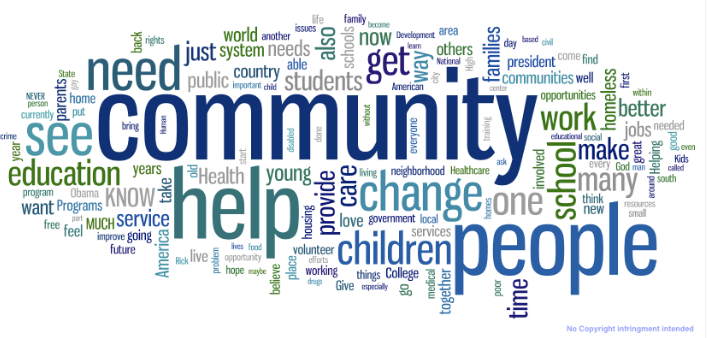The Community Court mission is to enhance community trust and quality of life by promoting participant accountability and providing links to individualized services.
The goals of Community Court are to:
- Improve safety and the quality of life for all community members
- Increase equitable outcomes by allowing successful participants to avoid criminal convictions which may impair future employment or housing
- Reduce re-offending
- Enhance trust of the community in the justice system
- Increase efficiency
The objectives of Community Court are:
- Immediacy: Reduce time from cite/arrest to first appearance and from first appearance to treatment
- Court Engagement: Participants will have a voice throughout the Community Court process - all interactions will work toward participants’ success
- Accountability: The Community Court will assist participants with responsible program participation through an individualized service plan and problem-solve with participants on any obstacles they may face
- Problem-Solving: Use evidence-based practices to determine the most appropriate level of supervision by identifying participant’s risk of reoffending and individual needs
- Partnership and Collaboration: Build a network of community partners, including government and community-based organizations, who are essential to participant success
Eligibility
The following offenses will generally be considered Community Court eligible offenses. Offenses designated as domestic violence offenses will not be permitted to opt in.
Because successful completion of this program results in the dismissal of the charge, the prosecutor retains the right to determine which cases are referred to Community Court.
- Criminal Trespass 2 (RCW 9A.52.080)
- Disorderly Conduct (RCW 9A.84.030)
- Intoxicating Liquor in the Park (VMC 15.04.120)
- Park Curfew Violation (VMC 15.04.150)
- Pedestrian Interference (VMC 7.04.020)
- Unlawful Bus Conduct (VMC 7.13.040)
- Unlawful Camping (VMC 8.22.040)
- Unlawful Storage of Personal Property in Public (VMC 8.22.050)
- Unlawful Transit Conduct (RCW 9.91.025)
- Urinating in Public (VMC 7.10.020)
Location/Hours
Community Court meets at 5107 E. Fourth Plain Blvd., Suite #105, Vancouver, WA 98661. We are located next to Hope Village, east of the General Anderson Vine Stop. The hours of operation are from 10:00 a.m. until court is concluded every Friday, except on court holidays.
The Community Court schedule is generally as follows:
- 10:00am - Participants arrive for community restoration projects on select Fridays
- 12:00pm - Community Court staffing begins for team members
- 1:00pm - Court opens, participants cited into court at this time; participants check in with service providers as required
- 2:00pm - Participants return from community restoration projects and check in with court and service providers as required
What Happens...
The process begins when an individual is cited by a Vancouver Police Officer or Clark County Sheriff’s Deputy for an eligible offense. The individual is cited and instructed to appear at the next Friday Community Court docket at 1:00 p.m., at the Fourth Plain location rather than the main courthouse. The cut-off time for the next Friday docket is Wednesday at noon. Eligible individuals appearing in District Court may also be referred to Community Court by a prosecutor with the concurrence of the individual and their attorney if applicable and ordered to appear in Community Court.
When new defendants arrive, they will proceed through a security station (if available) before entering the courtroom and/or service provider room. New defendants will be greeted by the coordinator and prosecutor. After a short presentation on Community Court, the defendant will have a chance to meet with a court-appointed attorney.
If the defendant is interested in participating, the coordinator will conduct a short risk/needs assessment and supplemental questionnaire and develop a case plan based on these assessments. The short screener used for the risk/needs assessment is the Criminal Court Assessment Tool (CCAT), which was developed and validated for misdemeanor populations by the Center for Court Innovation with support from the Bureau of Justice Assistance.
After the assessment, the coordinator along with the defense attorney and prosecutor will develop a case plan. The defense attorney will then review the plan with his/her client. The case plan will focus on criminogenic needs and accessing services such as identification and health insurance through community partiers.
The defense attorney and client meet in a confidential setting to discuss the client’s legal options, including the pros and cons of the community court in their case. This is where the client typically decides whether to participate in the program or to go through the traditional court process. If a potential participant would like more time to think about their options, the matter may be set out to the following Community Court docket, with the agreement of the parties and the court. The potential participant may also choose to opt out of the program, at which point the case is set on the traditional District Court docket.
If an individual decides to participate in the program, the defense attorney will obtain the individual’s signature on the petition and release of information forms. The defense attorney, individual and city prosecutor then go before the Judge to opt into the program. To allow time to complete the case plan, a participants will execute a speedy trial waiver commencing 90 days from the date they opt into Community Court.
Once a participant chooses to join the program, the individual is sent to the service provider room, where they are introduced to the providers on their case plan.
The participant submits a copy of the case plan to the provider, at which point, the provider may administer an assessment on-site, initiate a follow-up appointment for further screening and assessment, or give some instruction to meet or pick-up items (clothing, food, medication, etc.) at another location. These next steps are indicated in the case plan. The participant will be provided a checklist of services pursuant to the case plan. Providers will initial the relevant portions of the checklist indicating they consulted with the participant and any other important notes for the court and participants. Participants then returns the checklist to the coordinator.
